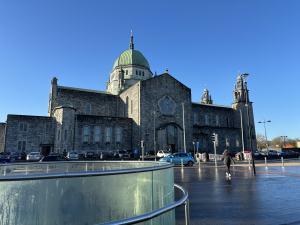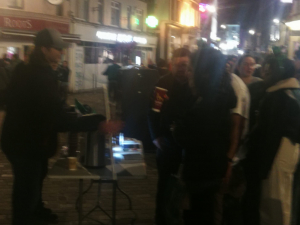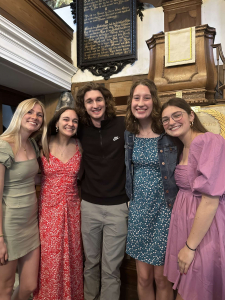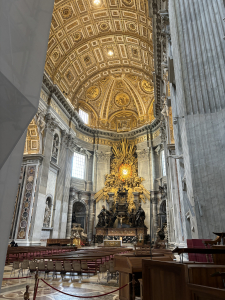Lex Orandi, Lex Credendi
If I am being honest, one of my biggest fears going into my study abroad experience was how my faith life would change while studying abroad in Ireland. I must confess I have a track record of being a weak Christian and not always taking my faith seriously. As I prepared to leave for Ireland, I thought about my first semester of college.
I was a freshman at Iowa State University studying Agricultural Business. Like most people at that age and in that position, I had no idea what I was doing with my life. I had moved hundreds of miles away from home, had no friends, and wasn’t in the best frame of mind. To keep a long story short, my first semester of college was a terrible experience, and one of the only things I remember is the constant pain of loneliness that I felt. I knew the answer to my problem at the time: go to God. Yet, for whatever reason, I didn’t turn to him. I floundered. I forgot about God. I skipped church. My prayer life? Nonexistent. I was on a downward spiral and losing my faith quickly. By the grace of God, I was able to get back on the right track.
Considering that that period of my life was the only significant length of time that I hadn’t been surrounded by fellow believers, I was nervous about how my time in Ireland would go. Therefore, I entered my study abroad experience with a plan for my personal faith life. Here was my plan of things to do to help nurture my faith:
- Daily Bible reading. I have been reading a daily Bible in a year plan since October of 2023. I continued to do my daily readings and reflect on them.
- Daily prayer entry. Not only did I journal daily, but I also wrote out a prayer each day. One of the most significant flaws with my prayer life is that my mind tends to wander. I’ve found that my mind stays more focused when I write my prayers. It’s also fantastic to read some of my prayers from throughout the experience and see how God answered them.
- Devotions. As a way to practice my Spanish and grow in my faith, Time of Grace ministries offer their daily email devotion in Spanish, so I’ve been reading those each day. I also took the opportunity to write a couple of devotions for fun.
- Reading. If you’ve kept up with my previous blogs, you would know I’ve read many books this semester. As of now, I’ve read 33 books. A couple of these books were Christian books. Most Christian books are practical, easily accessible, and present God’s Word in an easily digestible way.
- Church. Living in the age of live-streamed church services is excellent, but it’s nothing like attending a real church. Watching church online is fine, but it robs you of the opportunity to engage with fellow believers. Since COVID, many Christians have forgotten the great benefit of encouragement from seeing fellow believers every Sunday. I knew I needed to seek out a church, so I did some church exploring during my time in Ireland.
Overall, all of these things together have proved to be beneficial for my faith. My personal devotional life has never been so consistent and ardent. I can honestly say that my faith grew this semester. Romans 10:17 tells us that “faith comes from hearing the message”– the more the message about Christ was in my daily life, the more joy, hope, grace, and love flourished within my life. I also found a change in my mindset about my faith occurred. I began to stop looking at my faith as a monotonous checklist of things I needed to do. I quit seeing my faith life through “transactional” eyes. For example, by integrating more of God’s Word into my daily life, going to church on Sunday morning seemed less of a chore. Rather than seeing church as something to get through or “clocking in” with God, I was looking forward to worship. I suddenly found myself wanting to worship God. It was a radical change for the better, and I know the only reason it happened was through the power of the Holy Spirit and God’s Word.
I mentioned that I went church exploring in Ireland. As I mentioned, I wanted to find a church because Christian fellowship is vital. I also approached visiting these churches with differing doctrine as an opportunity to learn about other Christians’ beliefs and how to defend what I believe. Here’s how the process of church exploring went:
- The first Sunday I was in Galway, I attended a Methodist church. It was a small church with about thirty members. When I first walked into the church, I was greeted by an amiable lady, and I felt welcomed instantly. However, you can imagine my surprise at the start of the church service when that same lady walked to the front of the church and began to lead the worship service. Aside from the female Pastor, the service was okay. It had some liturgy, but it was mostly singing and a sermon. At the end of the service, I talked to some members about what the church believed and discovered they had very theologically liberal beliefs. Needless to say, I didn’t return the following Sunday.
- In my first week in Galway, I attended Catholic mass in the Galway cathedral. Now, I know what you’re thinking: “A Lutheran went to Catholic mass?!” Yes, I went to mass. I was curious to observe it because I had never attended a Catholic service. I was surprised by how similar the liturgy of the service was to a Lutheran service. But I didn’t really care for the veneration of Mary, so I didn’t return.
- I inadvertently attended a Pentecostal service. The University of Galway’s campus had posters for a Christian society called “Believers Connect.” With a name like that, it sounded like a great place to meet fellow Christians and potentially make new friends. I found their meeting time and place and arrived a bit early. I entered the meeting space and talked to some people who seemed normal. The service started with a guy on a Yamaha keyboard playing random chords and constantly repeating the words of Philippians 2:10-11 “At the name of Jesus, every knee should bow, in heaven and on earth and under the earth, and every tongue acknowledge that Jesus Christ is Lord.” This went on for about ten minutes before it finally ended. Then, someone else walked up and said that we would be doing “group prayer.” When I heard that, I assumed that someone would lead a prayer. I was wrong. “Group prayer” meant that everyone said their own individual prayers aloud. I didn’t participate, and I couldn’t even focus amid the chaos of several people all saying their prayers. Then, out of nowhere, a girl started pacing back and forth and began speaking in tongues! I was severely uncomfortable and probably should’ve left, but I didn’t want to be rude, so I stuck it out. Once the prayer time ended, the Pastor of the church showed up. Honestly, the rest of the service is a blur. The Pastor free-styled the “sermon” for 45 minutes, and I quickly got the impression that I had entered a church not with Jesus Christ as its head but a church with that Pastor as its head. I promptly left after the service, disgusted with the heresy and prayerful that God would cause the members of that church to realize the folly of their church’s teachings.
- Despite the atrocious experience with the Pentecostals, I wasn’t deterred from checking out another Christian society on campus. I attended my first Dochas Christian Society meeting and immediately realized that fellow believers surrounded me. They were welcoming and kind, and I quickly felt like I belonged. I met Eli (whom I interviewed for my previous blog), and he invited me to attend his church on Sunday. Curious, I went, and Covenant Christian Fellowship became my temporary church home for the semester. Covenant Christian Fellowship is a Reformed Presbyterian church, and while I do not agree with all of their doctrine, I did agree on the essentials and got to hear law and gospel every Sunday. I got involved in the church, and I like several aspects of it. It cannot be overstated how friendly and welcoming everyone was; they had a true community of believers. The members were also Evangelicals, and our shared belief in the importance of sharing the gospel was a common ground we could meet on. I appreciated the Pastor. He was well-trained in the scriptures, and I thought he was a strong leader who exemplified the characteristics of a called worker very well. While we did have a lot in common, the church had some differences that made me appreciate the WELS even more. First, they had a doctrine of the Sabbath, which essentially meant that they didn’t conduct worship services on any other day besides Sundays– I missed having an Ash Wednesday and Good Friday service to go to. Their services were also quite different– they were organized, but they didn’t have a liturgy, and they didn’t sing hymns. Instead, we sang psalms acapella, listened to scripture readings, and VERY long sermons, frequently as long as 40 minutes, often meaning that the average church service would be 1.5 hours. While I appreciated the in-depth exegesis that the Pastor did for each sermon, it was usually hard to pay attention if I didn’t take sermon notes. I also missed parts of the Lutheran liturgy, especially confession/absolution, reciting the creeds, and hymns.
- Finally, I got involved in the Dochas Christian Society, which has helped me in various ways. I made lots of Christian friends, and I was able to interact with them each week. I met so many people with very different backgrounds than my own, and it was interesting to talk to them about what they believed. I also got very involved. I did some street evangelism and led a Bible study on the book of Jonah! I loved learning about other Christians’ beliefs and sharing my Lutheran views. It surprised me that no one had ever really heard of Lutheran theology and what made it different from most Protestant theology. I underestimated how unique my beliefs are, especially concerning the sacraments. I’ll be honest: I did a terrible job explaining my beliefs, and I wasn’t always “prepared to answer” (1 Peter 3:15). Meeting so many people with different beliefs than mine forced me to research and consider why I believe what I believe. As a result, I became much more confident and assured that what the WELS teaches is correct.
My time in Ireland was edifying for my faith. By God’s grace, I grew in my faith and knowledge of Jesus Christ. All these experiences and time spent in God’s Word caused me to reflect on what I’m doing with my life. After careful consideration and prayer, I decided to change my career path. So, when I return to MLC in the fall, I will not be studying to be an English teacher; instead, I will be training to be a pastor! I want to be very clear that I did not have a “vision from God” or hear the voice of God in my head, but instead, I believe that God placed certain things in my life to cause me to think about how I could best serve him. After all of the experience that I gained in Ireland, I can genuinely say that there is nothing that I’d rather do than serve God with all my heart, soul, mind, and strength. God has blessed me with gifts and talents to be a pastor and a teacher. Both are excellent ministry opportunities, and I believe I could serve God well in either capacity. However, similar to the old adage about rectangles and squares, all pastors can be (and are) teachers, but not all teachers are pastors. Therefore, if I trained to be a pastor, I would be opening myself up to even more opportunities to serve God, and I could maximize the use of my gifts and talents.
All in all, the most valuable thing that happened to me in Ireland was the opportunity that it gave me to reflect on my beliefs and career path. If there’s anything I learned, it’s that solitude and pondering benefit me. I would also encourage others to find ways to “turn down the noise” of our everyday lives and take intentional time to reflect on their beliefs and purpose in life. I’m very grateful for the opportunity to study abroad and learn more about myself. I look forward to my future training and gospel ministry.
Photos explained:
- A photo of the Galway Cathedral
- A terribly blurry photo of me doing street evangelism
- Easter Sunday service with the fellow MLC study abroad students!
- Photo from inside St. Peter’s Basilica in Rome!




